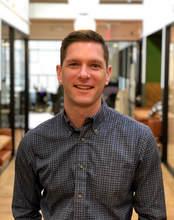 Brad Rathgeber Brad Rathgeber Earlier this week, I went with friends to see the new documentary “Won’t You Be My Neighbor” about the life and influence of Fred Rogers. I grew up watching Mr. Rogers’ Neighborhood. My mom reports that when Mr. Rogers came on at 5pm on CPTV, I’d sit quietly and listen, transfixed by Make-Believe and the man who made sure that children knew they were special and valued, no matter who they are. The theater was packed, mainly with people my age, alternately laughing and crying through the movie. It is a beautiful film that reminds you of the good that one person can do and the power of those who speak quietly, listen carefully, and smile effusively. As we left the theater, a friend said to me, “Can’t we just stay in that theater, in Mr. Rogers’ world, for the next couple of years?" Revisiting the world of Mr. Rogers years later, as an adult and as an educator, his insights struck me in a different way. In his time, Rogers’ belief was groundbreaking: children have feelings and opinions and voices that should be listened to, cared for, and nurtured. His understanding was radical then, but it’s common now. All of us in education today know we do better when we listen to our students, support them, and value them. Other parts of the movie caused me to pause. As told, Rogers was conflicted later in his life, wondering whether he was making the difference he hoped for, as he saw chaos around him and the medium of television creep farther away from the purpose he held dear. And, whereas Rogers daily reminded each child of their inherent self-worth and power of uniqueness, he actively encouraged a colleague to remain closeted. That’s problematic, and also emblematic of his time. ... At One Schoolhouse, we create some of our courses to respond to the issues that are emblematic of our time. This past school year, we ran a new course, “Gender and Sexual Identity in America.” Students explored the changing nature of identities over time, including efforts to expand and restrict identities in cultural, religious, and political forms. Students research initiatives such as gay marriage, gender assignment, reproductive rights, workplace discrimination, HIV/AIDS, heteronormativity, and more. Near the end of the course, a student reflected upon their journey and brought up an area in which One Schoolhouse could value more the uniqueness of our students’ experiences: “In our ever-changing society, it is important that we be open to and inclusive of all genders, both within and outside of the gender binary. I think it is especially important to foster open-mindedness in a school environment, as this is precisely the place in which we, as students, begin to form our own opinions on the world around us. By changing ‘co-ed’ classes to ‘all genders’ classes, One Schoolhouse would welcome individuality and promote the acceptance necessary to create a supportive community of unique thinkers! The student is right. We’ll make that change. It feels like each day, we learn more about the complexities of identities that make each person unique . And, as we learn and grow, we interrogate our understandings and beliefs (and, yes, word-choice) to be more open to differences in experience. That makes the messages of Mr. Rogers -- to listen to children and to value the special qualities we bring to this world -- more important today than ever before.
0 Comments
 Brad Rathgeber Brad Rathgeber How well would you do on a short quiz about independent school finances? • What percentage of independent day school revenue comes from tuition: 59%, 69%, or 79%? • How about the percentage from gifts and grants: 8%, 12%, or 25%? • What about other programs and auxiliary services (campus rentals, summer camp, after school, etc.): 5%, 7%, 10%? Now, let’s switch to the expense side. • What percentage of independent day school expense comes from faculty and staff salaries and benefits: 48%, 60%, or 72%? • How about instructional costs: 2%, 4%, or 8%? • And, finally, how about facilities: 10%, 14%, or 24%? If you are like the cohort of great educators who just took the course that Jeff Shields and I taught for NBOA & One Schoolhouse, “Budget Meets Mission,” the answers may surprise you. 79% of revenue in independent schools comes from net tuition, with only 8% from gifts and grants, and 7% from other programs and auxiliary services. 72% of that revenue goes to cover faculty and staff costs, with 4% to instructional costs, and 10% to facilities. These numbers often surprise even experienced members of the independent school community. Why? There seem to be a few reasons:
Are there models we should be looking at to get at the these two main drivers? Sure. I’ll explore some of those next month. * Data accessed for 2017-2018 school year from NAIS DASL |
Don't miss our weekly blog posts by joining our newsletter mailing list below:AuthorsBrad Rathgeber (he/him/his) Archives
July 2024
Categories |

 RSS Feed
RSS Feed